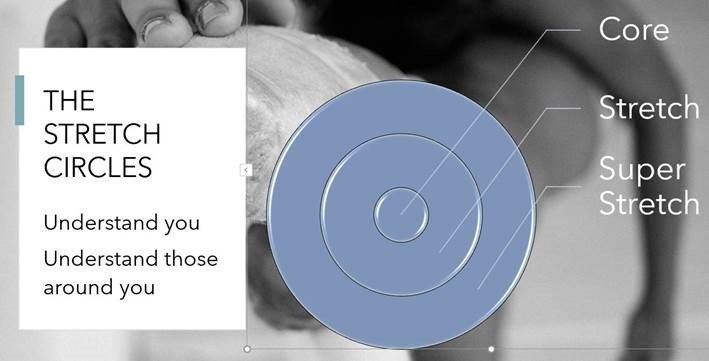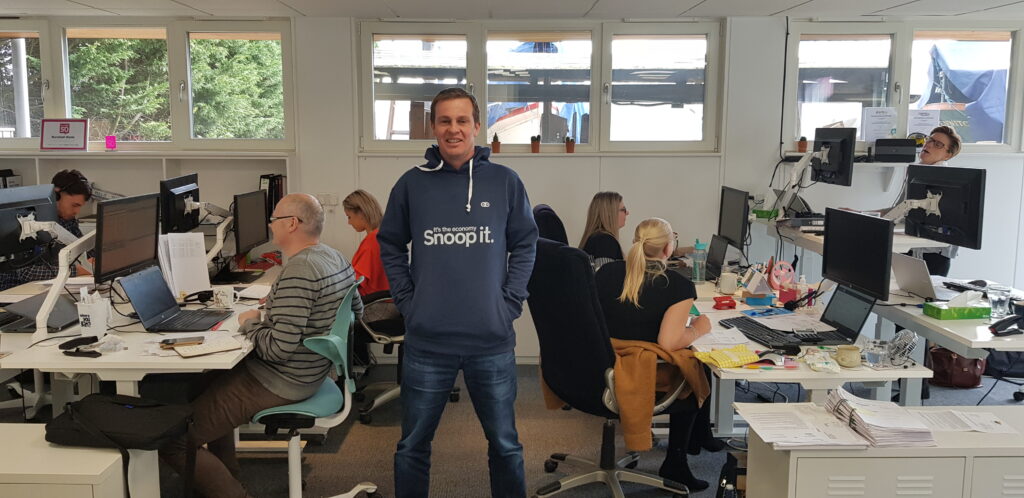For those of you who attended ‘How to build and manage high performing teams’ you will know putting a lens on performance is something I am passionate about.
… and retrospectives are important. It is easy to judge an event on ‘entertainment’, but in the cold light of day it is good to reflect and think about what we have taken away. One of my former mentors always encouraged me to ‘Steal with pride’!
So here are my personal 7 take-aways from NorDevCon2020:
1. Bigger is not always better
In relation to ‘Hubs: An Organizational Construct for Scaling Agile Development’. Great to hear Jim Coplien speak in person and reassuring to hear I share his views on Agile at Scale ‘at best – extremely problematic’. The efficiency and effectiveness of focussed self-organising teams presents a real threat to large hierarchical corporates. The ability of smaller organisations to pivot products and services or even their entire offering in a matter of weeks is set against enterprise organisations still undergoing transformations that are bracketed in years! I’ll definitely be looking more closely at this from our own work with high performing teams.
2. Always stretch
There was a strong ‘People theme’ throughout the conference and Karen Poulter (Head of ISD at Hutchison Ports) keynote was no exception. Managing teams through ‘change’ is challenging and Karen gave us some useful insights. I particularly enjoyed her Stretch Circles Analogy.
Core is where you are most comfortable. Your natural or learnt skill set, communication style, product or industry you understand. The problem with core is if you stay there all the time your core gets smaller.
Stretch is where you learn and grow but it is rooted in core. It may be using a core skill set in a new way or trying something different in a safe environment.
Super stretch is where the magic happens. This is where you find out what you’re capable of. But, it can be hugely stressful and no one can stay there too long without it being a risk to their well being. You should always be aware of when you’re in super stretch and how to get back to stretch or core if needed.
To use this take your goal; break it down in to the 5 things you would need to achieve that goal and then workout how those tasks match to your core circles. There should be one core, one super stretch and, preferably, the rest in stretch. 2 or more super stretch is too much and you should modify your goals or tasks. 2 or more core and yo need to ask yourself if you’re trying hard enough; you’re at risk of stagnating.

I really related to this. Having sold a business in 2015. I took some time out. At best I was only using ‘core’ skills. It was amazing how quickly my self-worth fell when there was no ‘stretch’ at all. When starting a new business there are a lot of stretch activities and it is generally good fun. As the team expands and more specialist skills are required there is a danger that founders find themselves with too many stretch and super stretch activities. This is unsustainable and can definitely impact upon well-being.

3. Be kind
‘Tool Shaming’ – Jim Seconde provided an entertaining view on Developer ‘elitism’ and destructive tool shaming by x10 Rockstar Devs ? who do not regard certain languages or their exponents as proper developers. I was amused by the ‘it devalues us as Developers’ comment (like an 11-year-old footballer can’t be a footballer, because it devalues the skills of a footballer – nonsense!). Elitism amongst the developer community is not a new thing, but it is an interesting one. When I first started attending tech events – there were a few sneers – ‘very much who is the corporate w**ker in the suit’. I do appreciate a Digital Pimp is not always welcome.
Over time I have learnt a lot (not least of all, why the hell am I wearing a suit and tie, at all… ever) and in general, events have become more inclusive, but where did this elitism come from? When I first got involved in the tech recruitment in the late 90’s I would say the majority of the serious devs (largely named as Analyst Programmers) had learnt there trade on the job – many emerging from business roles and being the one in the department who could see the value in programming as a way of solving business problems.
Does elitism come from the 2nd generation developer community who have emerged as the first full generation to grow-up with dev as a career? Is it the result of the way Dev teams have been treated by the wider business community – misunderstood and confined to the basement? (I appreciate this is an unhelpful stereotype). Either way, I agree with Jim it is destructive and unhelpful for all of the following reasons: it damages the shamer’s reputation and that of their organisation, it is not positive in terms of talent attraction, it is corrosive for apprentices and more junior members of staff, it is a potential blocker for cross-tooling collaboration, it does not portray the tech community in a good light… it’s not kind!
4. Be seen
I really enjoyed Mark Williams-Cook – SEO – of Candour’s very engaging talk on SEO tips. This was really well pitched. Interesting for Technical and non-technical audience. I took back several good tips, particularly how to use schemas to enrich search results and improve your Click-through-rate. We produce quite a lot of ‘how to’ or job advert content and I certainly feel we can improve our SEO in 2020.
In a conversation afterwards another delegate recommended https://www.fullstory.com/. It looks pretty awesome, but I need to explore further! Anyone out there used ‘fullstory’ and have an opinion?
5. Look after your gun and your gun will look after you
Chris O’Dell left me feeling that it is not by chance that Monzo have managed to shift the software dial. Another interesting ‘keynote’.
When discussing high performing teams I dedicated some time to making sure the Infrastructure is right. Chris really focussed on DX (Developer Experience) and supporting the Dev team by making sure Tooling is optimised.
It is all too easy when there are 100 other things to be getting on with to ignore the tooling (and of course poor tooling or tooling that is no longer fit for purpose tends to lead to more pain and more time consuming projects.
Having a team construct where taking a group out of BAU to actually improve DX (when only the Dev team may be aware of the difficulties and constraint) is, I suspect, all too rare.
Like people who make sure they have all the DIY tools, a nice clear space on the floor and have fully read the instructions (including checking all the pieces are identified) before starting the construction of a flatpack piece of furniture. Inevitably they are the same individuals who put those tools back in good order when they can find them for the next task (as opposed to me with a set of tools (assembled one at a time) and returned to the garage in a barrow – blades blunt and batteries flat).
Those folk who have invested in their tooling and their organisation, are usually ahead of the rest.
6. You’re not alone
I am loving the focus on wellbeing. It is so healthy. Some interesting insights from Nicholas Walsh of UEA.
I never knew antidepressants did not ‘fix’ a chemical imbalance in the brain. It’s a myth I have been unintentionally propagating (apparently pharmaceutical company marketing rather than scientific insight). So antidepressants have a positive impact on roughly 1 in 3 adults, but there is evidence to suggest the social construct around the individual can be far more important. Where the recipient is suffering from Shit Life Syndrome is a term to refer to a ‘shit life’ caused by poverty; it seems that antidepressants are more prescribed in areas experiencing a lot of social deprivation and poverty, so rather than fixing any (non-existent) chemical imbalance, it’s more important to change the social environment. So when one of our colleagues is experiencing mental health challenges it is likely not just the practical support (time allocated with a mental health first aider, empathy-driven communications, flexible working patterns to meet needs etc) but a great-life-at-work-syndrome to further aid recovery; indeed creating a work environment where individuals facing specific challenges can still THRIVE.
7. You can’t have too many friends in this game
Most importantly, I met old friends and made new friends… and there are a few new potential alliances emerging …!
Thank you for all your positive messages regarding ‘how to build and manage high performing teams’. I really appreciate your feedback good and bad. I have taken on board a couple of learnings already:
i) Be wary of over focussing on happiness and perhaps use the term more carefully. I need to explore more about how I define it, how I use it and the part it plays in motivation. (Part of the confusion owes to whether you aspire to happiness as a means or an end, and to the issue of the Buddhist notion of happiness (very deep in one’s hara) or the I-just-drank-a-half-bottle-of-wine happiness are in any way related. Jeff’s notion didn’t seem to be either. Engagement certainly seems a more useful metric and avoid getting people’s hopes up in a misguided way.
ii) I also strayed into using the word ‘Empowerment’. I apologise for this. I am not a fan of the term and agree with the feedback ‘Research shows that empowerment more or less equates to abdication — of management washing its hands of responsibility for decisions in their organisation, with the concomitant repercussions for accountability. (Hecksher has conducted research in Pítney-Bowes, Honeywell, AT&T, and other firms that have had empowerment programs and have found that empowerment really hurt teams and the global performance of the organization)
For those of you who wanted to dig a bit deeper into how you build and manage your high p[performing teams then Alex (Scotton) is looking at organising at some follow-up workshops.
Finally, thank you Alex and Shaun for making it happen. Running an event of that size takes time effort and no small degree of stress. Well done NorDev!
… and thank you to Snoop, who kindly sent me a ‘Snoop hoodie’


